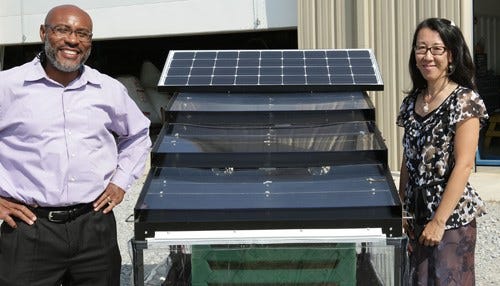JUA Technologies Develops Crop Dryer to Battle Food Scarcity
 JUA Technologies plans to produce about 250 dryers for beta testing in Nigeria
JUA Technologies plans to produce about 250 dryers for beta testing in Nigeria
Subscriber Benefit
As a subscriber you can listen to articles at work, in the car, or while you work out. Subscribe NowBorn and raised in Nigeria, Dr. Klein Ileleji knows first-hand the challenges farmers face in developing countries, and it’s inspired his invention that uses the muscle of Mother Nature. Long-term crop storage is critical in developing countries for a reliable food supply, but due to moisture in a fresh state, they must be dried first. Farmers in developing countries often spread crops along the roadside to dry—a method riddled with problems. An associate professor of agricultural and biological engineering at Purdue University, Ileleji has developed a solar-powered crop dryer that still relies on the sun, but also harnesses the power of technology.
Ileleji says, in developing countries, as much as $20 billion worth of food goes to waste per year, largely because it’s not dried properly.
“In developing countries…it’s very common to see people drying crops by the roadside, on the road itself or on the median, because it’s a large hard surface,” says Ileleji. “I’ve seen crops take up half the road in Ecuador.”
In addition to not being sanitary, the crops can be ruined by insects or animals. Ileleji believes his solar-powered crop drying device could be the answer for small-scale farmers; he’s co-founded West Lafayette-based JUA Technologies International LLC to commercialize the product. The company name is inspired by the Swahili word for sun, which is “jua.”
The technology consists of two components: drying trays that are loaded into the device and the dryer itself. Ileleji says the trays can be used independently of the dryer; they have a protective cover and can dry crops traditionally in the sun. The trays can also be stacked inside the dryer, which deploys modern technology to accelerate and improve the drying process.
“Energy from the sun is brought into the chamber, where crops will be in the trays, being dried by fans powered by the solar panel,” says Ileleji. “Radiant energy from the sun is being captured on a surface, which heats up the air; that air is pulled into the drying chamber by fans that are powered by the solar panel.”
The device produces a high-temperature, high air-flow and low-humidity environment—the ideal condition for efficiently drying crops.
“We want to have units produced in the thousands,” says Ileleji, who is JUA Technologies chief executive officer and chief technology officer. “We want it to be as common as buying an oven or cell phone; you bring it home, set it up, and it’s ready to go.”
JUA Technologies expects to produce about 250 dryers for beta testing and is focusing its initial efforts in three developing countries: Nigeria, Senegal and Kenya. While a dryer holds fewer crops than a tarp on the roadside, Ileleji says it’s sanitary, affordable and will protect the value of farmers’ crops; quality fruits and vegetables could be exported and command a high market value.
“Rather than it taking three days to dry [crops] on the ground, it takes about 10 hours to dry in the dryer,” says Ileleji. “It might be in smaller units, but you’re increasing the throughput.”
JUA Technologies is also testing the device in the U.S. with small farmers in Indiana and Georgia who are using it to dry things like herbs, flowers and spices.
The startup earned $20,000 from the Elevate Purdue Foundry Fund, and Ileleji’s work is also part of a USAID project that focuses on post-harvest food handling and processing.
JUA Technologies is currently working with African-based manufacturers that could help scale up production. Ileleji says his motivation for creating a company is to grow the technology to help address one of the world’s grand challenges.
“As we look at food security in the world, especially with the population expected to increase to nine billion by 2050, addressing issues that will affect all of us on the globe is something that interests me,” says Ileleji. “Unless we have companies with a bold vision putting people and technology together, we’re not going to solve these problems for small farmers and address global food insecurities. That’s the culture I want to bring to JUA. No one is stepping up to do that, so we need to.”
Ileleji says his bold vision for the startup aligns with Purdue University’s desire to address global agriculture issues.
Ileleji says the dryer will come with optional auxiliary power to increase its efficiency on cloudy or rainy days.
